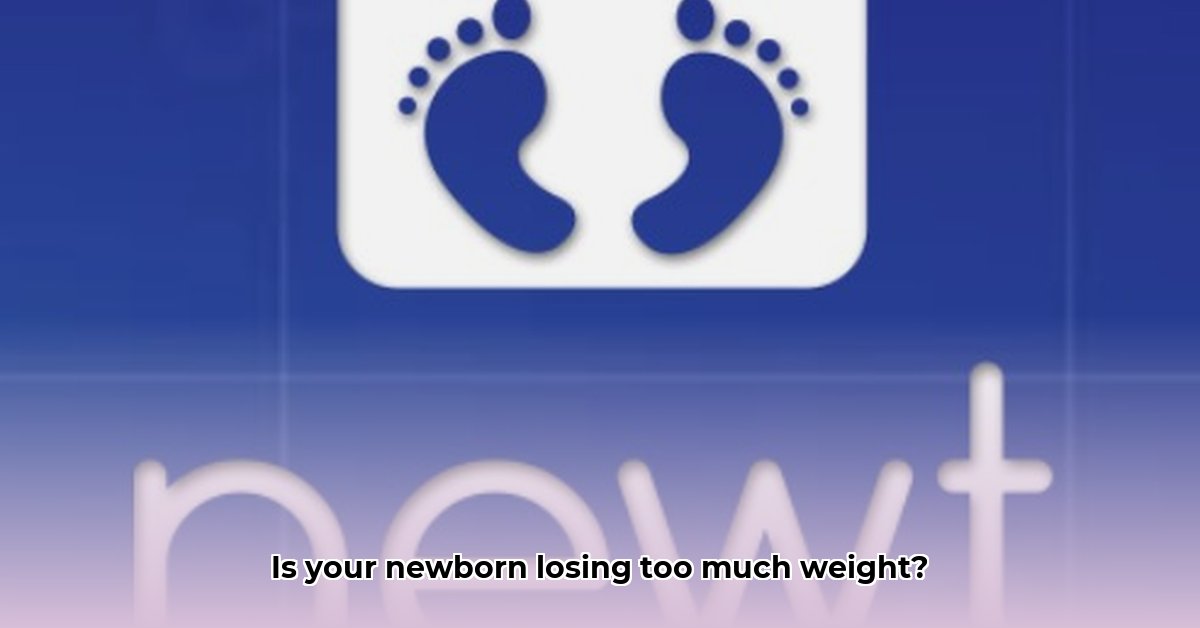
Bringing your baby home is a joyous occasion, but it also brings many questions, especially regarding your newborn's health. One common concern is newborn weight loss. This guide will empower you to understand and monitor this crucial aspect of your baby's development, providing you with the knowledge and tools to navigate this phase with confidence.
Understanding Newborn Weight Fluctuations
It's normal for newborns to lose a small amount of weight in their first few days of life. This usually isn't a cause for alarm; it's a natural adjustment to life outside the womb. Babies shed excess fluid and their digestive systems are just beginning to function.
How much weight loss is considered normal? Generally, a weight loss of 5% to 10% of birth weight within the first week is expected. Most babies regain their birth weight, or even surpass it, by two weeks old.
However, weight loss exceeding 10% or a failure to regain birth weight by two weeks warrants a call to your pediatrician. This isn't necessarily an emergency, but early intervention is key to ensuring your baby's well-being.
Calculating Your Baby's Weight Change: A Simple, Step-by-Step Guide
Calculating your baby's weight loss percentage is straightforward. Follow these steps:
Record Birth Weight: Carefully record your baby's weight immediately after birth. This is your baseline.
Weigh Regularly: Use a reliable baby scale and weigh your baby at the same time each day, preferably in the morning before feeding. Consistency is crucial for accurate tracking.
Determine Weight Difference: Subtract your baby's current weight from their birth weight. This gives you the total weight change.
Calculate Percentage: Divide the weight difference by the birth weight, then multiply by 100. This yields the percentage of weight lost.
Example: A baby born weighing 7 pounds now weighs 6.7 pounds. (7 - 6.7) / 7 * 100 = 4.3% weight loss. This is within the expected range.
When to Contact Your Pediatrician
While some weight loss is normal, contact your pediatrician if:
- Your baby's weight loss exceeds 10% of their birth weight
- Your baby hasn't regained their birth weight by two weeks of age
- You observe other concerning signs like excessive sleepiness (lethargy), difficulty feeding, or unusual fussiness. These could indicate underlying health issues requiring prompt attention.
"Early intervention is vital," says Dr. Emily Carter, Pediatrician at Children's Hospital. "Regular checkups and prompt communication with your doctor ensure your baby receives the best possible care."
Digital Tools: Helpful, But Not a Replacement for Professional Advice
Several apps and websites facilitate weight tracking and offer comparisons to other babies. While convenient, these tools should not replace regular checkups and professional medical advice. Every baby is unique, and these tools lack the nuanced understanding a pediatrician offers.
"These apps can supplement your monitoring, but they are not substitutes for professional care," advises Dr. Maria Rodriguez, Neonatologist at County General Hospital. "A pediatrician can consider the complete clinical picture, including gestational age and feeding method."
Key Factors Affecting Newborn Weight Loss
Several factors influence newborn weight loss. Are you breastfeeding or formula feeding? Was your baby born prematurely? Understanding these variables helps interpret weight changes more effectively.
Gestational Age:
Premature babies (born before 37 weeks) may experience more significant weight loss than full-term babies due to their ongoing development and less mature physiological processes.
Feeding Method:
Breastfed babies might exhibit higher initial weight loss but generally catch up quickly. This is often due to the adjustment to breastfeeding. Formula-fed babies may show a more gradual weight loss pattern.
Interpreting Your Baby's Weight Loss Percentage
- Less than 7%: This typically falls within the normal range for healthy, full-term newborns. Though continued monitoring is important, significant concern is usually unwarranted.
- 7-10%: Consult your pediatrician. This falls into a gray area, requiring individualized assessment based on your baby's overall health and development.
- Over 10%: This requires prompt medical attention. Such substantial weight loss indicates a need for evaluation and potential intervention. Don't hesitate to contact your doctor immediately.
Remember, maintaining consistent feeding and closely monitoring your baby’s overall health alongside weight monitoring is crucial.
Beyond the Numbers: Observing Your Baby's Overall Well-being
While weight loss percentages are valuable, it's equally important to observe your baby's overall health. Is your baby alert, active, feeding well, and voiding normally? These observations, alongside weight tracking, provide a comprehensive picture of your baby’s health.
The Bottom Line: Trust Your Instincts and Your Doctor
Parenting is a journey of learning and growth. Don't hesitate to reach out to your pediatrician with any questions or concerns. They are your most valuable resource, always ready to provide personalized guidance. Trust your instincts as a parent, but always seek professional advice to help your baby thrive!